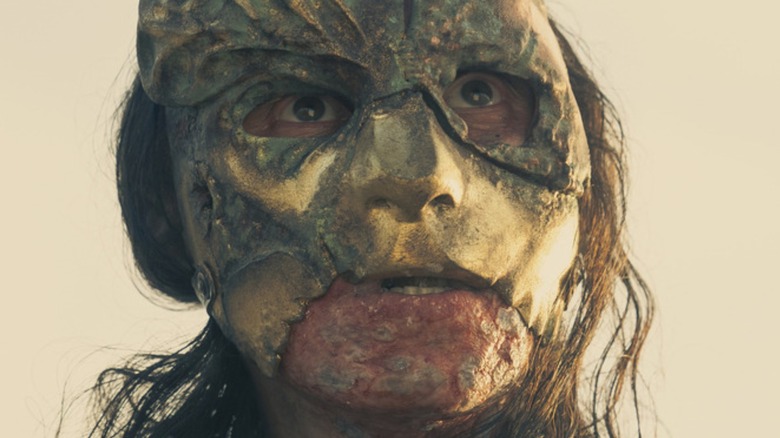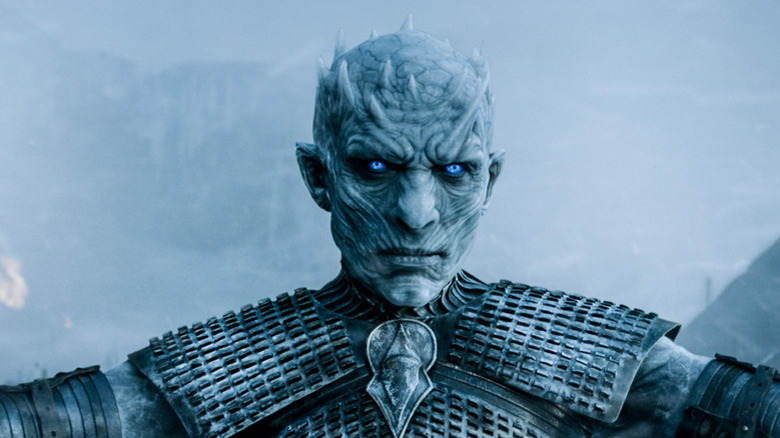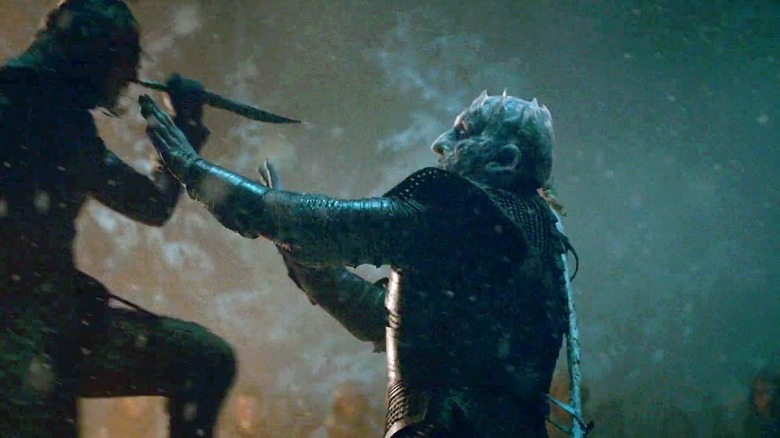House Of The Dragon's Crabfeeder Reminds Us Of The Night King, And Not In A Good Way
Contains spoilers for "House of the Dragon" Episode 3
The ending of "House of the Dragon" Episode 2 introduces viewers to the show's first truly visually intriguing villain. Craghas "Crabfeeder" Drahar (Daniel Scott-Smith) is a guy whose nickname tells you everything you need to known about his preferred method of execution and body disposal. A high-ranking member of the Triarchy, Crabfeeder has conquered the strategically important Stepstones islands. As a result of this action, the era's finest seafarer and reigning Master of Ships, Lord Corlys Velaryon (Steve Toussaint), isn't very happy.
The "Sea Snake" forms an alliance with disgraced Daemon Targaryen (Matt Smith), and in Episode 3, they face off with Crabfeeder's forces on the Stepstones. In a desperate bid to get the win before reinforcements come in, Daemon hatches a daring plan to use himself as bait to draw Crabfeeder out from the caves he uses to avoid dragonfire. Against all odds, the desperate maneuver works — and, after a thrilling battle sequence, Daemon manages to chase Crabfeeder down and kill him.
Crabfeeder has clearly been a formidable villain, because there's a time skip of over two years between Episodes 2 and 3, and he's still holding the Stepstones. With his ravaged features and golden face mask, he's also a very memorable-looking guy. Unfortunately, the viewers don't actually get to enjoy him for very long, and the ease with which he's defeated is enough to remind us of "Game of Thrones" villain Night King (Richard Brake and Vladimír Furdik) ... and not in a very good way, either.
Crabfeeder is set up as a Night King-style threat, and goes down just as easily
Let's say that a show introduces a visually interesting and super threatening villain, only to make him mostly just stand around looking creepy while everyone else does the majority of the fighting. Despite the ominous way he's set up, the villain ultimately gets killed off surprisingly easily. Doesn't that exact same description apply to both Crabfeeder and the Night King?
Apart from the fact that Crabfeeder isn't a supernatural threat, there's of course one significant difference. By the time Arya Stark (Maisie Williams) stabs the Night King to death in "Game of Thrones," the villain has been a constant, looming threat since Season 4. As such, while the leader of the White Walkers does go down over the course of a single episode, at least he's been around for a while.
Crabfeeder, on the other hand, only gets that ominous intro shot in the end of Episode 2. The show then fast-forwards through all of his cool moments — of which there must have been a whole bunch, considering that he seems to have been successfully holding Lord Corlys' forces and Daemon's dragon at bay for over two years. We don't even see his gruesome death scene — instead, Daemon bisects Crabfeeder offscreen, after the character has appeared in a grand total of barely two episodes.
Is House of the Dragon trying to learn from old mistakes or repeating them?
"House of the Dragon" seems to be trying to retcon "Game of Thrones" Season 8 with the way it's handling the parent show's endgame mistakes. With George R.R. Martin's increased involvement and the benefit of hindsight, it's easy to imagine that the prequel would take care to steer clear from the events that led to the final episode of "Game of Thrones" being dubbed one of the worst series finales in TV history.
Though it doesn't happen in the actual series finale, the Night King's swift and relatively unassuming downfall seems like the kind of thing "House of the Dragon" wouldn't be willing to touch with a ten-foot pole. Yet by introducing Crabfeeder in a "Big Bad" fashion and doing away with the character after one episode of hectic battle, it seems that "House of the Dragon" is not only revisiting the icy villain's "Game of Thrones" fate, but actually rubbing it in the viewer's face by having the entire storyline happen off-screen.
Granted, it's entirely possible that "House of the Dragon" is deliberately invoking the whole "strong-looking villain vanquished surprisingly easily" trope in order to build Daemon up as a shrewd operator. Still, it's pretty strange that the show chooses to do this with a callback to the show's least-loved era ... and if it's unintentional, well, that's a worrying sign for fans who are hoping that the prequel will avoid the pitfalls of the original.


